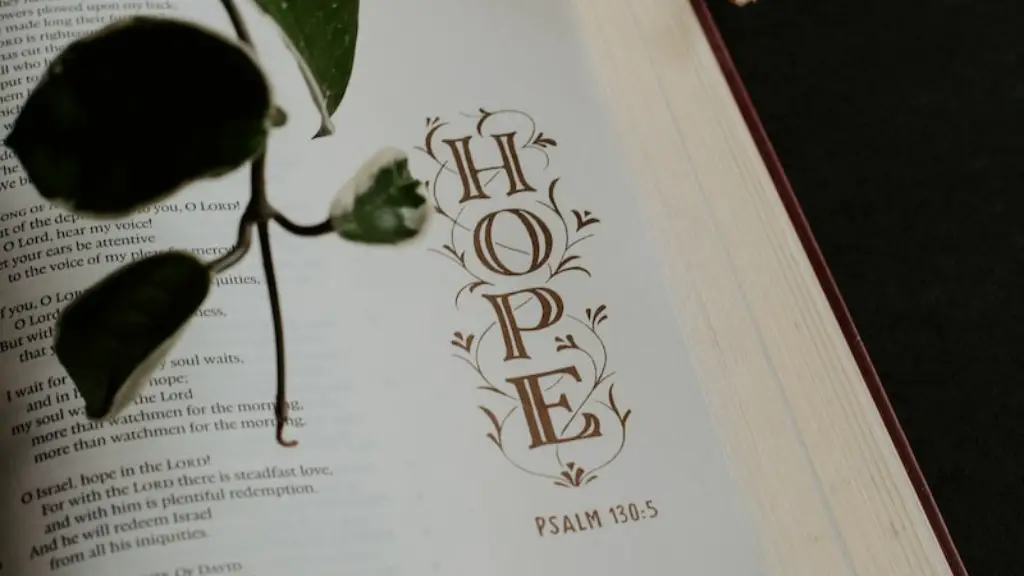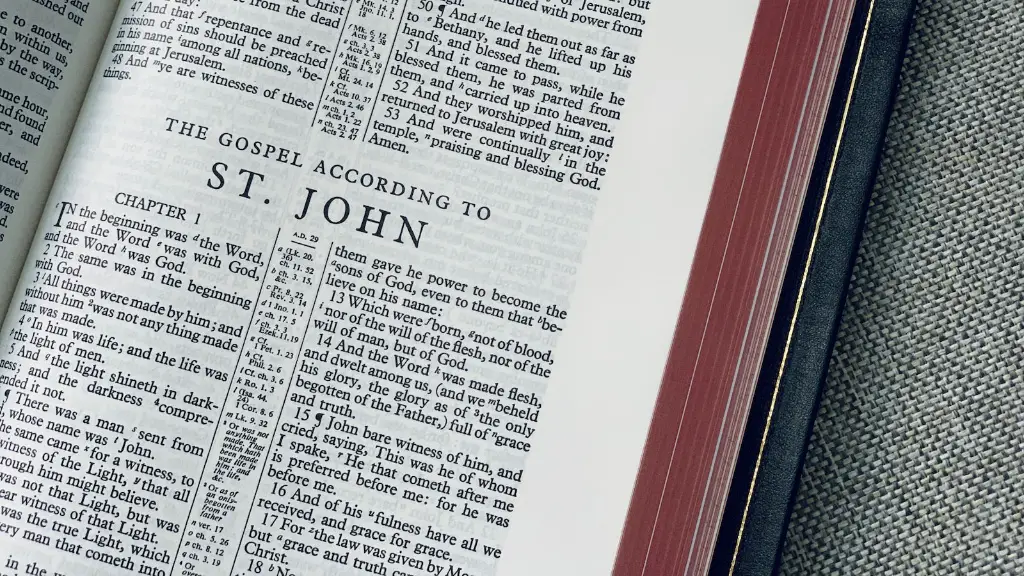Overview of the Second Book of The Bible
The second book of the Bible is Exodus. It is one of the latter books of the Pentateuch, the first five books of the Bible. It is believed to have been written by Moses and covers the events leading up to and including the Exodus of the Israelite people from Egypt. The book covers the enslavement of the Israelites in Egypt and God’s command to Moses to take his people out of slavery in Egypt. The events leading up to and including the Israelites’ departure, the agreements made by God with his people, and the laws and commandments given to them by Moses in the wilderness form the core of the book. It is historically significant as it represents the story of the Israelite people’s beginnings.
Exodus is a book of liberation, prophecy and ancient promises that have strong ramifications for today’s world. The events in it have been referred to as faith-building moments for a number of generations. It presents a narrative of hope, of an all-powerful yet merciful God, and of a people whose faith will ultimately be rewarded. It is a reminder of the power of deliverance and freedom and of God’s commitment to it.
The book of Exodus follows the story of the Israelites from Egypt to the promised land. It is the story of Moses leading the Israelites through their 40-year journey in the wilderness. It recounts the Ten Plagues of Egypt, the Parting of the Red Sea and the arrival in the promised land. It also outlines the blueprint of the Tabernacle, a holy dwelling place for the Israelites, and as such forms a basis for understanding how the Israelite faith and its religious practices developed.
The Key Role of Moses
The book of Exodus is the story of the Israelite leader Moses and his journey with the Israelites to the promised land. Moses is an important figure in the book of Exodus, as he is seen as the one chosen by God to lead the Israelites out of Egypt and into the promised land. He is a courageous leader, who is unafraid to speak up for his people, stands up to Pharaoh and performs miracles in the presence of God. He is also seen as a faithful mediator between God and the Israelites and is credited with receiving the Ten Commandments on Mount Sinai.
Moses is a key character in the book of Exodus not only by leading the Israelites to the promised land, but also because he brings God’s laws and commandments to the Israelites. His role is to ensure that the Israelites abide by the laws and commandments that God has given them and to provide them with a path to redemption and how to live in a just and holy manner. The book of Exodus is also important in understanding the covenant between God and the Israelites, as it outlines the conditions of the covenant and explains how God will protect and provide for His people.
The book of Exodus is also important in understanding the relationship between God and humans. God speaks to Moses throughout the book, instructing him on how to proceed and guiding him to lead the Israelites to their ultimate freedom. It is through this communication that we see God’s justice, mercy, and love for His people, as well as His unattainable standards for holiness and righteousness.
The Ten Commandments
The Ten Commandments are central to the book of Exodus. They are given to the Israelites by God and Moses on Mount Sinai, and form the basis of many of the ethical and moral laws that form the basis of Judaic and Christian traditions. The Ten Commandments are seen as a rule by which the Israelites should lead their lives, and are based on mercy, justice and respect for God and His creations.
The Ten Commandments can be seen as the foundation of ethical rules and behavior. They are designed to protect the Israelites from sin, and to show them how to live according to God’s will. For many, the Ten Commandments are seen as the basic laws of morality in human societies, and are seen as a basis for understanding right and wrong. Even today, many countries have adopted these laws as the basis of their legal and moral systems.
Symbolism in the Book of Exodus
The book of Exodus is packed full of symbolism. It contains a number of symbols that point to the presence of God in the lives of the Israelites. The burning bush, for instance, is seen as a sign of God’s presence with the Israelites. The sea is also seen as a symbol of separation, strengthened by the parting of the Red Sea for the Israelites as they escaped Egypt. The cloud and the column of fire are also seen as symbols of guidance, protection and divine intervention.
The Passover, which takes place at the end of the book, is also an important symbol. It is seen as a symbol of redemption and deliverance. The Passover also represents the presence of God in the lives of the Israelites, as it is He who delivers them from their suffering in Egypt. The Passover is a reminder that freedom and deliverance can come in a variety of forms, if only we are willing to listen for God’s guidance.
The Message of Liberation
The book of Exodus tells the story of the liberation of the Israelite people from slavery in Egypt. The events described in the book are seen as a metaphor for liberation from bondage and oppression, and a reminder of God’s help in times of need. It is seen as a source of hope and faith in difficult times, and a reminder that even though life can be difficult, with God’s help, freedom and redemption are possible.
The book of Exodus also serves as an example of the kind of faith that the Israelites were to have in their God. By following God into the unknown, they demonstrated their faith in his power and his plan. It is a reminder that faith is essential to living a righteous life, and is a valuable source of guidance and direction.
The book of Exodus is a reminder of what it looks like to follow God, to have faith in Him, and to trust Him in times of darkness. It speaks of courage, wisdom and the power of prayer, and serves as a reminder that with God on our side, freedom and redemption are possible.
The Tabernacle
The Tabernacle, or dwelling place for the Israelites, is one of the most important elements in the Bible. It is mentioned multiple times in the book of Exodus and is seen as a symbol of the relationship between God and His people. The Tabernacle was constructed according to the instructions given to Moses by God, and it served as the spiritual home of the nation of Israel.
The Tabernacle is significant because it was a place where God’s presence dwelt among the Israelites. It served as a physical focus of worship, and the Israelites were instructed to bring their sacrificial offerings to the Tabernacle. As such, it served as a place where the Israelites expressed their faith, and where they could gather to worship and commune with God.
The Tabernacle is important in understanding the relationship between God and the Israelites. It is a reminder of the covenant that God made with His people, and of his faithfulness. It is a reminder that no matter what happens, God will always be with us and will provide for us.
The Tabernacle is also important in understanding the laws and commandments that God gave to the Israelites. It served as a place to discuss and ponder on the law and its implications, as well as a place to remember God’s love for His people. It was a symbol of God’s faithfulness and what it means to live in accordance with His will.
Feasts and Festivals
Feasts and festivals are important elements in the book of Exodus. They serve as reminders of the Israelite liberation and of God’s faithfulness in keeping His promises. They are a reminder of covenants God made with His people, as well as celebrations of the remembrance of His power and deliverance.
The most important feasts and festivals mentioned in the book of Exodus involve the Passover. The seven-day period of unleavened bread known as the Feast of Unleavened Bread commemorates the day that the Israelites left Egypt. The seven-day Festival of Weeks, known as Pentecost, is a celebration of the giving of the Law to Moses and the arrival of the Ten Commandments. The seven-day Festival of Booths is a celebration of sheltering the Israelites during their time in the wilderness.
Feasts and festivals provide a spiritual foundation for the faith of the Israelites. They are a reminder of God’s covenant with His people and a celebration of the special relationship between God and the Israelites. They are also an opportunity to celebrate the gifts of freedom and deliverance that God has provided.
The Significance of Exodus in Today’s World
The book of Exodus has a number of significant stories and lessons that are applicable to the world today. The themes of liberation, redemption, and the power of God’s promises are just as relevant today as they were in ancient times. The book of Exodus can serve as an example of how to be strong and faithful in difficult times, and of how we are to respond to those in need.
Exodus speaks of courage, justice, and the power of prayer. It is a reminder that with faith, courage, and determination, redemption can be achieved. It speaks of the power of prayer, of being obedient to God, and of trusting in Him during times of uncertainty. It is a reminder that God’s will is greater than our own, and that with Him, all things are possible.
The book of Exodus can also be seen as a source of hope and inspiration. It speaks of the power of faith to move mountains, the power of perseverance in the face of adversity, and the power of God’s love and mercy. It is a reminder that with God on our side, we are never truly alone and that He is always present and ready to help us in times of need.





